Disclaimer: This article may contain affiliate links. Clicking on them may earn Costa Rica Vibes a commission, at no extra cost to you. Thank you for your support!
Birds of Costa Rica: The Most Unique and Where to See Them
Did you know that there are over 800 species of birds in Costa Rica? The birds of Costa Rica are abundant, unique, and extremely photogenic.
Quetzals, hummingbirds, toucans, and more can be spotted by the avid birdwatcher or even the novice when lucky.
We created this guide so you can discover some of the most common and beautiful birds as well as learn about the best places to spot them while traveling in Costa Rica.
Just note, we are only mentioning a small variety of birds in Costa Rica. There are tons of other birds you will likely spot during your travels. However, we tried to highlight the most popular birds that you will likely enjoy seeking out.
Hummingbird
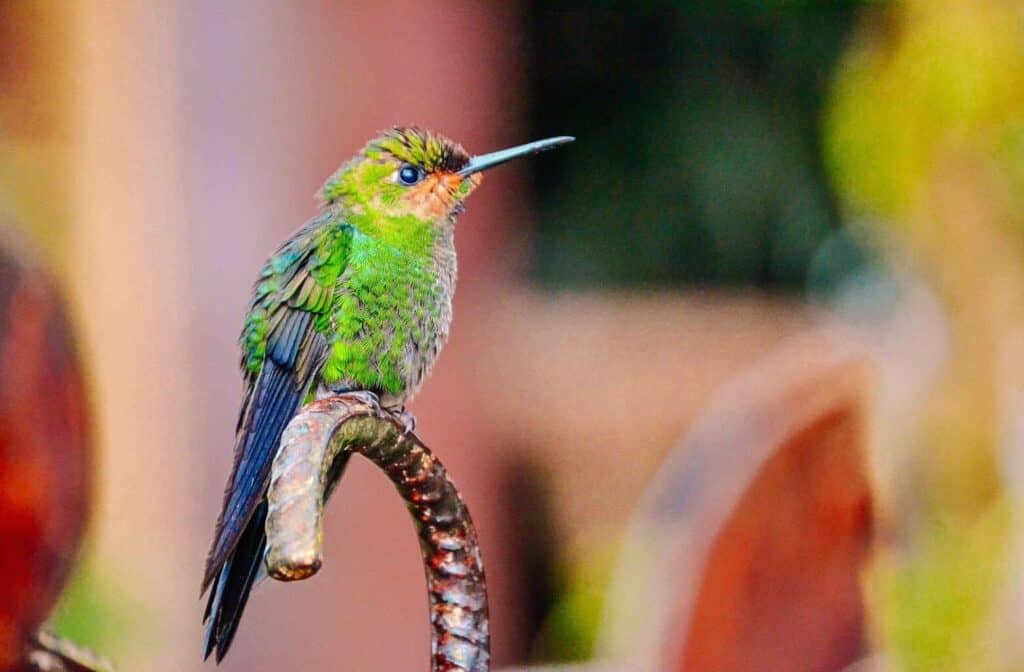
Varieties
There are over 50 hummingbird species in Costa Rica.
Where to See Hummingbirds
It is possible to spot hummingbirds buzzing around all over the country.
In fact, because hummingbirds are so prevalent, many nature parks put up hummingbird feeders to attract them.
In San Jose, we have some little humming friends that visit our backyard garden almost every day. It’s awesome!
Behavior
– For you bird novices, you can usually spot a hummingbird by the way it seems to levitate in mid-air. This is actually done by rapidly flying its wings, which creates a humming noise (hence the name hummingbird).
– Hummingbirds have a diet of insects (for nutrition) and nectar (for energy).
– Some hummingbirds migrate, but some of the species in Costa Rica also live here year round.
Parrots and Maccaws
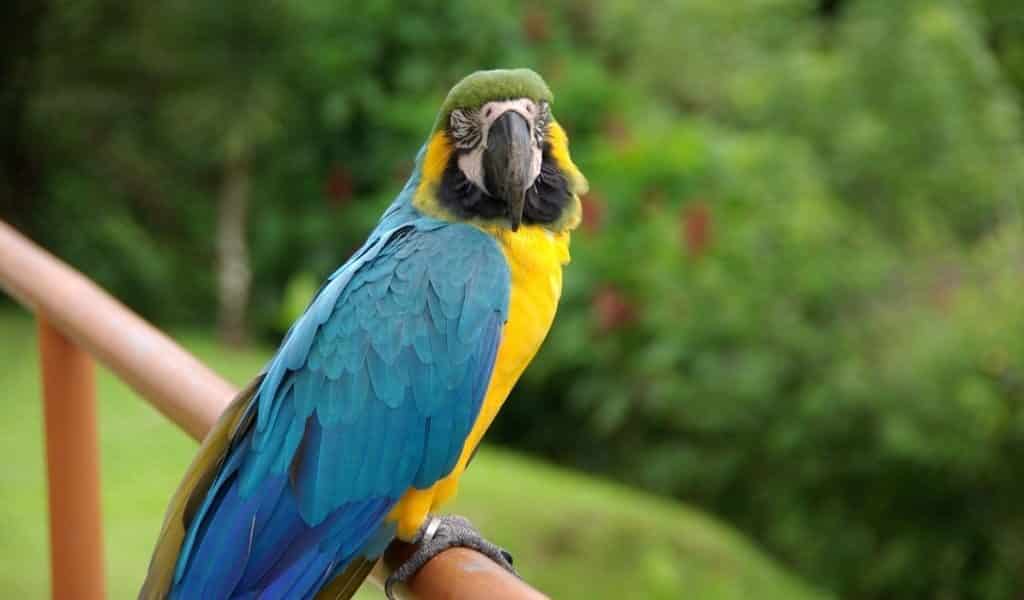
One of the most recognizable and popular birds in the world, parrots, and macaws can easily be recognized by their vibrant colors, large size, and distinct face.
Varieties
There are believed to be 17 different species of parrots and macaws living in Costa Rica.
The most common parrots and macaws that you may spot in Costa Rica are; scarlet macaws, great green macaws, and the crimson fronted parakeet.
Where to See Parrots and Macaws
One of the best places to spot parrots and macaws is in the Jaco area. They seem to love to hang in the trees around here.
Once we even saw about ten scarlet macaws having a little get together in a tree while on the beach in Jaco.
Unfortunately we only had our phones and couldn’t get a great picture, but it was still very cool.
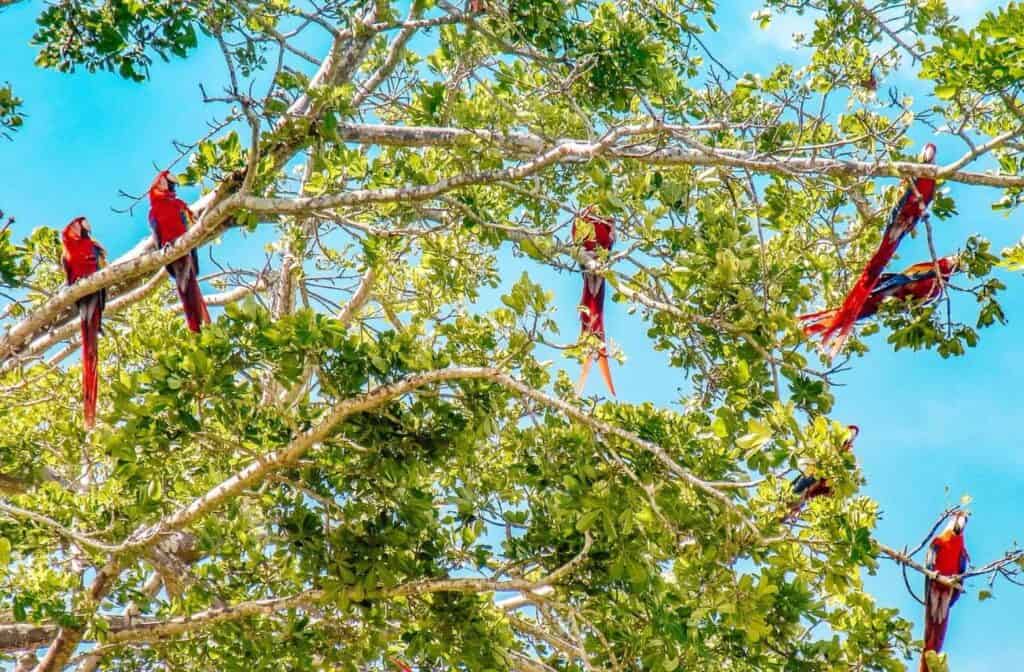
The Osa Peninsula (Corcovado National Park area) is also a great spot to keep an eye out for parrots.
Behavior
– Parrots diet mostly consists of seeds. Even if you spot one eating fruit, it is mostly likely picking through the fruit to get to the seed.
– Most parrots are monogamous breeders.
– Most nests are built in dead tree cavities.
Birdwatching Day Trips Throughout Costa Rica
Monteverde: Check Rates and Availability of the Bird Watching Tour with Estaban
Jaco: Book Your Bird Watching Experience with Sergio
La Fortuna: Book Your Birdwatching Tour at Mistico Arenal Hanging Bridges Park
– Female parrots take on all of the incubating process in most varieties.
– Most varieties of parrots can imitate human speech.
– They are considered to be some of the most intelligent species of birds.
Toucans
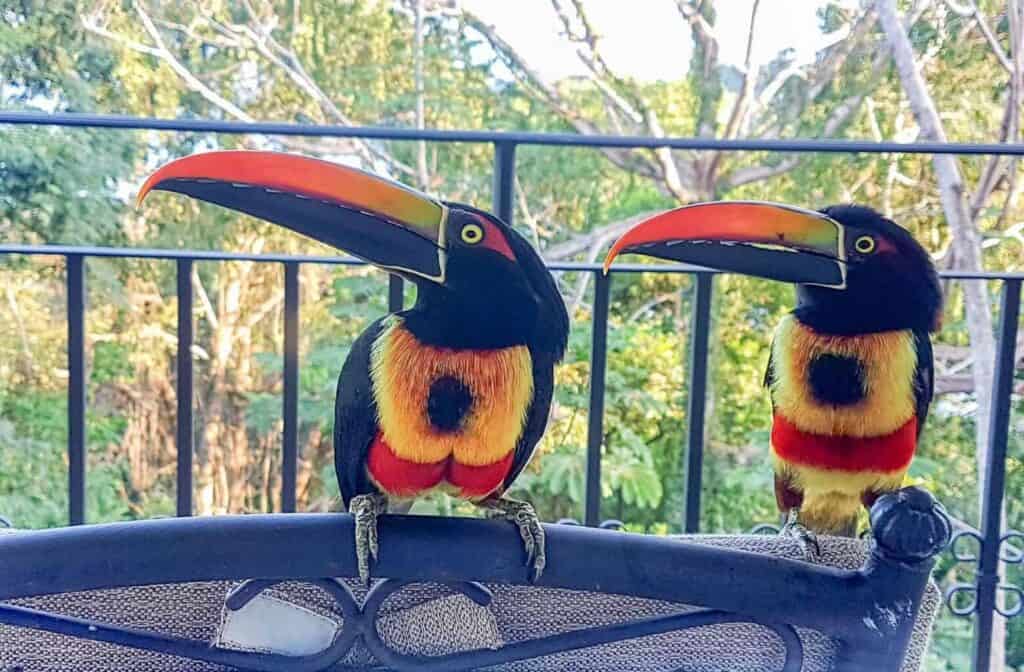
Toucans are easily recognizable by their bright colored bodies and long beaks. Personally, they are my favorite bird to spot in Costa Rica. I just find them so amazing to look at.
Behavior
– Toucans are social and tend to gather in groups of 10 to 20 birds.
– They eat mostly fruit, but if they are struggling to find enough fruit toucans will eat some small insects.
– They have also been known to take eggs from nests of smaller birds to eat.
Varieties
There are six types of toucans you may be lucky enough to spot while in Costa Rica.
These varieties are the keel-billed toucan, Yellow-eared toucanet, collared aracari, black-mandible, fiery billed aracari, and the emerald toucanet.
The two in the picture above are collared aracari. We had the pleasure of these two visiting our hotel balcony every day during a visit to Manuel Antonio.
Where to See Toucans
Some of the best places to look for toucans are the lower Pacific Slope (Manuel Antonio, Dominical, Uvita area), the Monteverde cloud forest area, and the Tortuguero area on the Caribbean coast.
Resplendent Quetzal
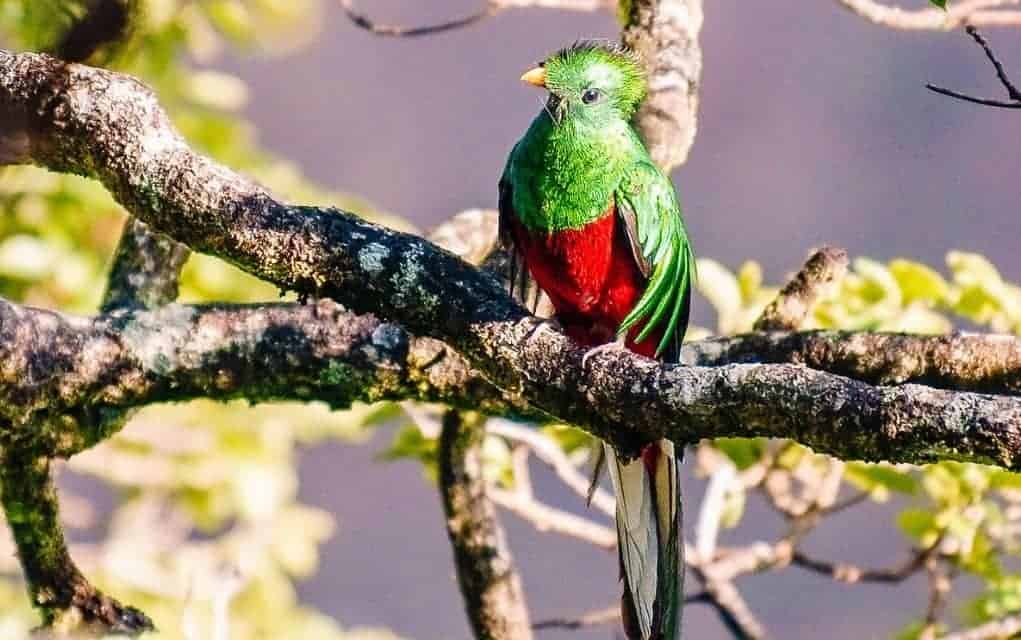
Here’s a little story for you. The first time Thomas and I visited San Gerardo de Dota in Costa Rica we went there as a little weekend getaway from San Jose.
We instantly fell in love with the area (it’s one of my favorite places in the country).
Anyway, we stayed at the Savegre Hotel (which I highly recommend) and on our first day we were like “what is going on?”
The only people staying at this hotel were us and this group of about 15 US tourists who were visiting the area on a multi-day quetzal tour.
The tour group spent every day hiking and looking for quetzals. On our first evening at the hotel, the tour group had an art class in which everyone got a wooden bird to paint.
Anyway, that was our introduction to the majestic quetzal and the hype surrounding them.
Behavior
– Quetzals typically eat a diet heavy in fruit, avocado, and some insects.
– Males attract female mates with songs.
– Females typically lay two eggs per breeding cycle.
– Females and males take turns incubating the eggs.
– The egg incubation time lasts 18 days.
– Typically, the female will leave before the baby quetzals are fully reared.
– The male will then take on the role until the babies are ready to be out on their own.
Where to See Quetzals
You can spot quetzals in cloud forest areas such as Monteverde and San Gerardo de Dota. However, they are not always the easiest bird to spot.
Trogons
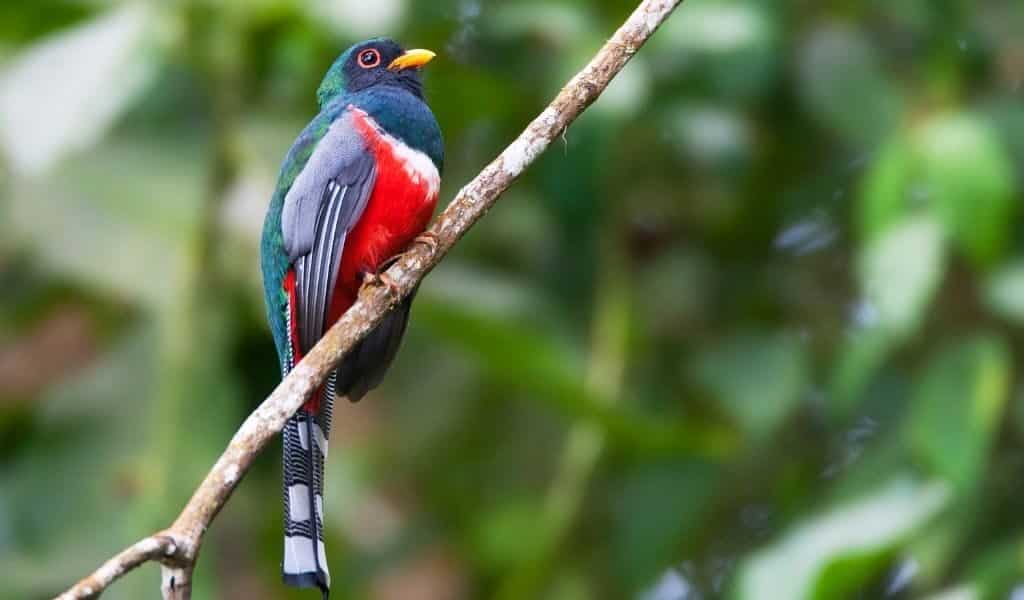
The quetzal listed above is technically a species of trogon, but we decided to give it its own section. So, on to the rest of the trogons you might see in Costa Rica.
Varieties
Costa Rica is home to ten species of trogons. Besides the quetzal, the two most notable species varieties are the Collared Trogon and the Lattice Tail Trogon.
Behavior
– Trogons are relatively inactive, but are also rather reclusive. In other words, they are not the easiest to spot for birdwatchers.
– They eat insects (such as caterpillars) and fruit.
– Trogons are monogamous and males attract female partners by singing.
– They make nests by carving out space in rotting wood.
Where to See Trogon
Both the Collared Trogon and Lattice Tail Trogon are most often spotted on the Caribbean coast.
Tanagers

Varieties
There are over 50 species of tanagers in Costa Rica. So, I am not going to list them all. 😉
Behavior
– Most tanagers live in a small group or in pairs.
– They typically eat; fruit, nectar, seeds, and insects.
– There is not a lot of known info regarding their mating and reproduction process. However, it is known that they nest in trees and often 3 to 5 eggs are laid at a time.
Where to See Tanagers
Because there are over 50 species of tanagers in Costa Rica, it is often possible to spot them in every area of the country if you are lucky.
Great Tinamou
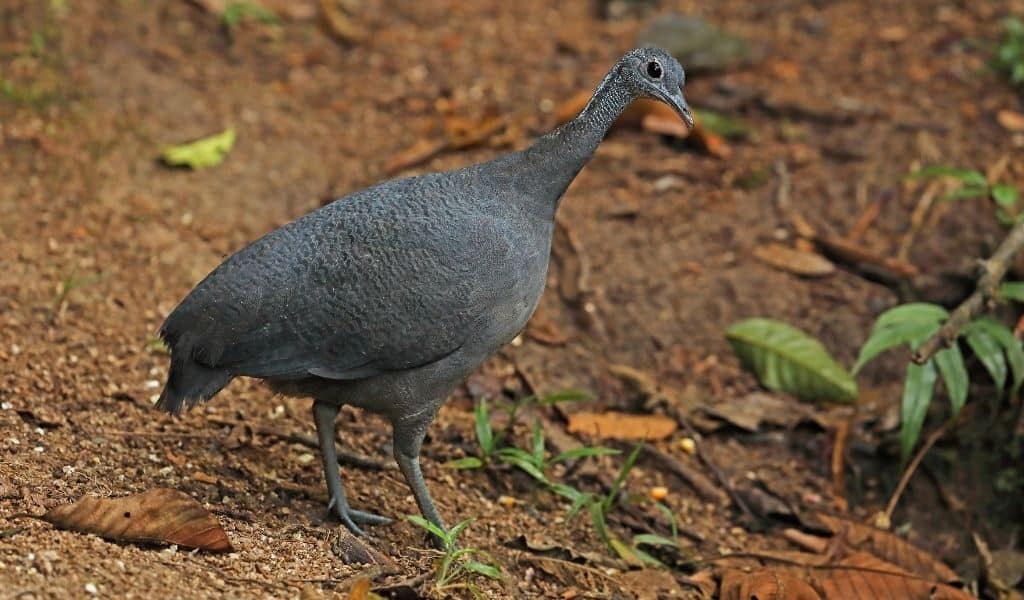
Varieties
There are believed to be five varieties of Great Tinamou in Costa Rica. These are:
Highland Tinamou, Great Tinamou, Little Tinamou, Thicket Tinamou, and Slate-breasted Tinamou
Where to See Tinamou
Tinamou can be seen all over the country. This varies by variety. For example, the Highland Tinamou is common in high places such as Monteverde and the Great Tinamou is more common in lowland areas (we saw one at Carara National Park once near Jaco).
Behavior
– Tinamous spend most of their time on the ground rather than in trees. In fact, they are not great at flying.
– When breeding, male will attract a female with calls as well as by trying to appear larger.
– Most tinamous nest on the ground. In fact, they typically do not build nests but instead lay their eggs on a soft bed of leaves.
– They eat a wild variety of food depending on each type of tinamou. This variety includes fruit, seeds, and plants.
Motmots
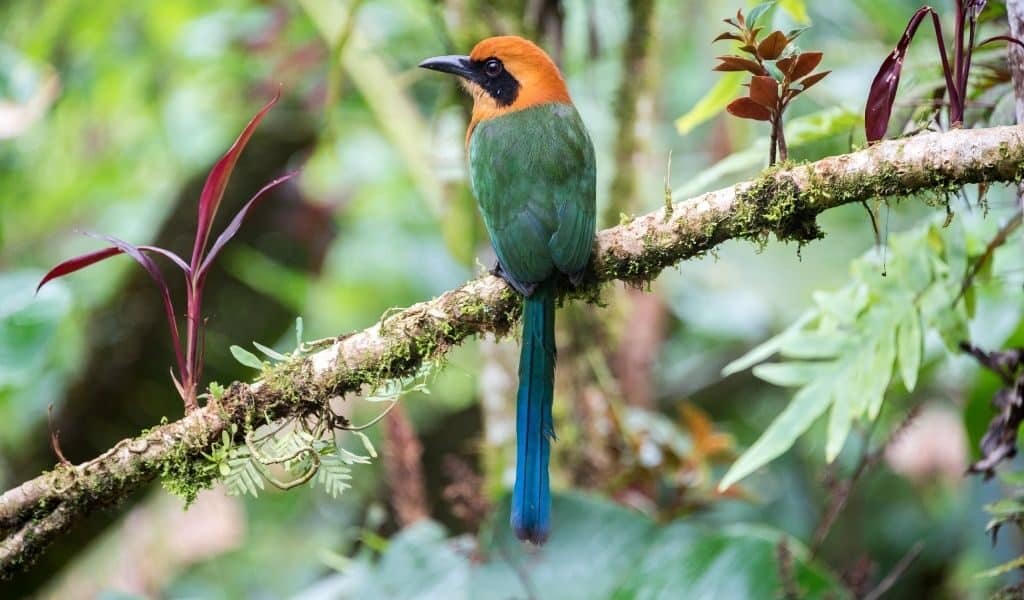
Varieties
There are six species of motmots which call Costa Rica home. These are the:
Tody Motmot, Lesson’s Motmot, Rufous Motmot, Keel-billed Motmot, Broad-billed Motmot, and Turquoise-browed Motmot
Where to See Motmot
They can be seen throughout the country, however they can be difficult spot. We have heard that typically the easiest to see are the Turquoise- browed Motmot which can be spotted along the Southern Pacific coast.
Behavior
– Motmots eat mostly small insects and lizards. However, they will also sometimes eat fruit.
– Motmots have two hanging tail feathers that are very fragile and have been known to fall off easily.
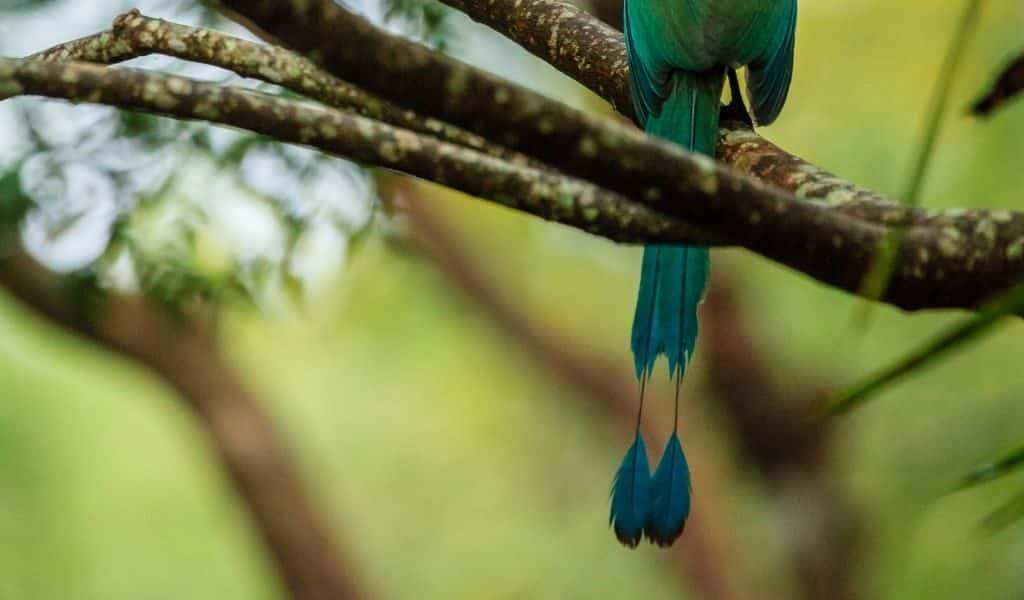
– When breeding, the females always lay four eggs, which hatch after about 20 days.
– Both male and female care for their young.
Bird Watching Tours
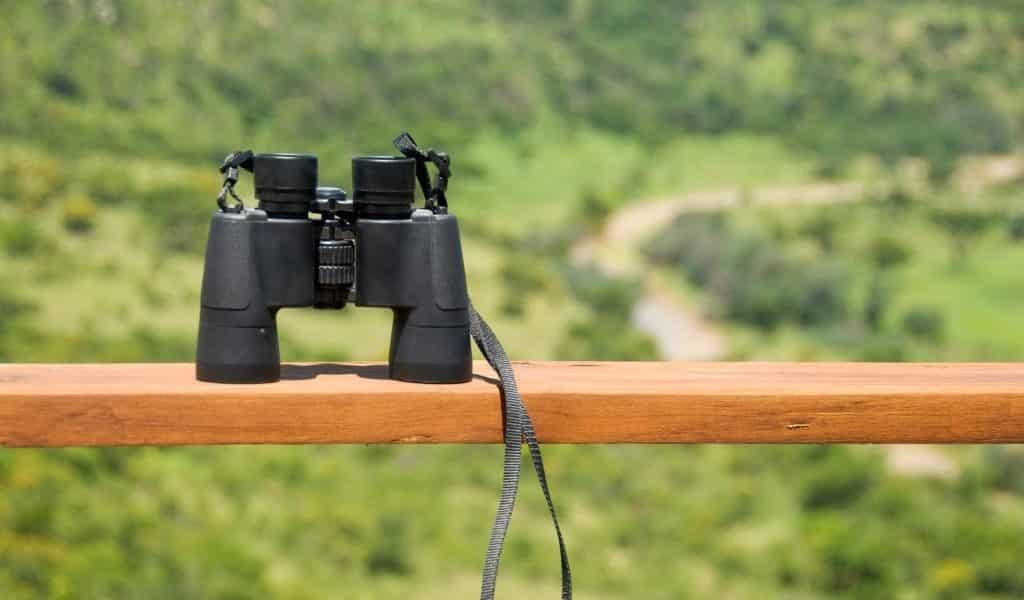
A popular way to explore Costa Rica is with a bird-watching tour. It is possible to find day tours devoted just to bird watching and even actual bird-watching trips that last for several days.
Our Costa Rica Birdwatching Suggestions
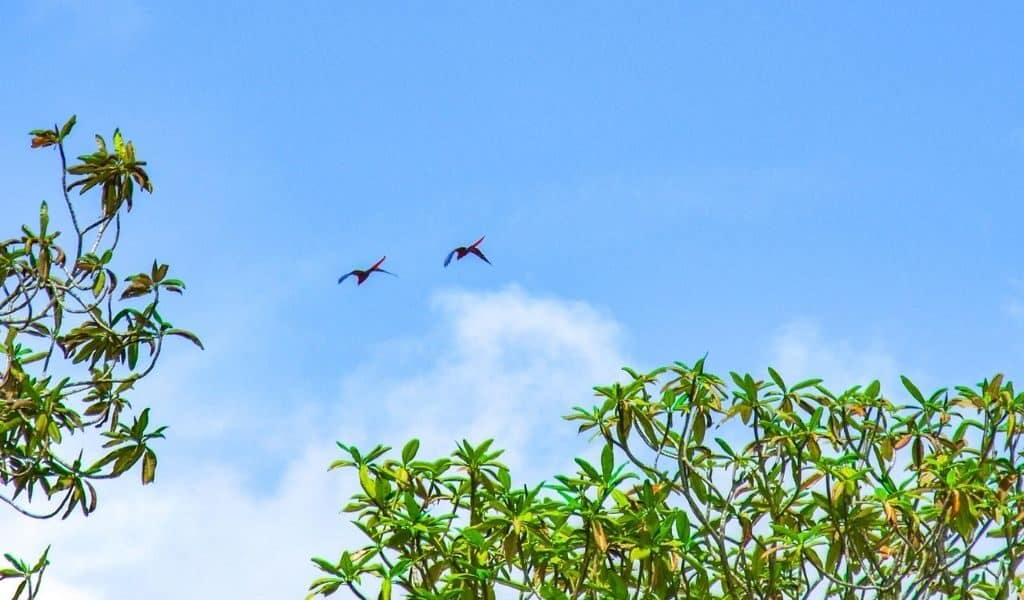
-There are many amazing national parks in Costa Rica. These are always a good place for bird watching. A few of our favorites are Cahuita National Park, Curu Reserve, and Cabo Blanco.
Manuel Antonio National Park is also a great place for birdwatching, but there are typically a lot more people there than at the other national parks.
– In the big national parks it is usually possible to hire a local guide. It can be a bit pricey, but these guides typically know the animals of the area very well. Let them know that you have an interest in spotting birds and they will definitely do what they can to find some unique species for you.
-We are not professional with our bird-watching equipment by any means, but we have two types of binoculars that we use in Costa Rica and really like both.
We have one set of pocket binoculars which are super helpful when traveling light. We also have a set of binoculars with a cellphone holder. This set is great because you can attach your phone to take zoomed in pictures like this. ↓
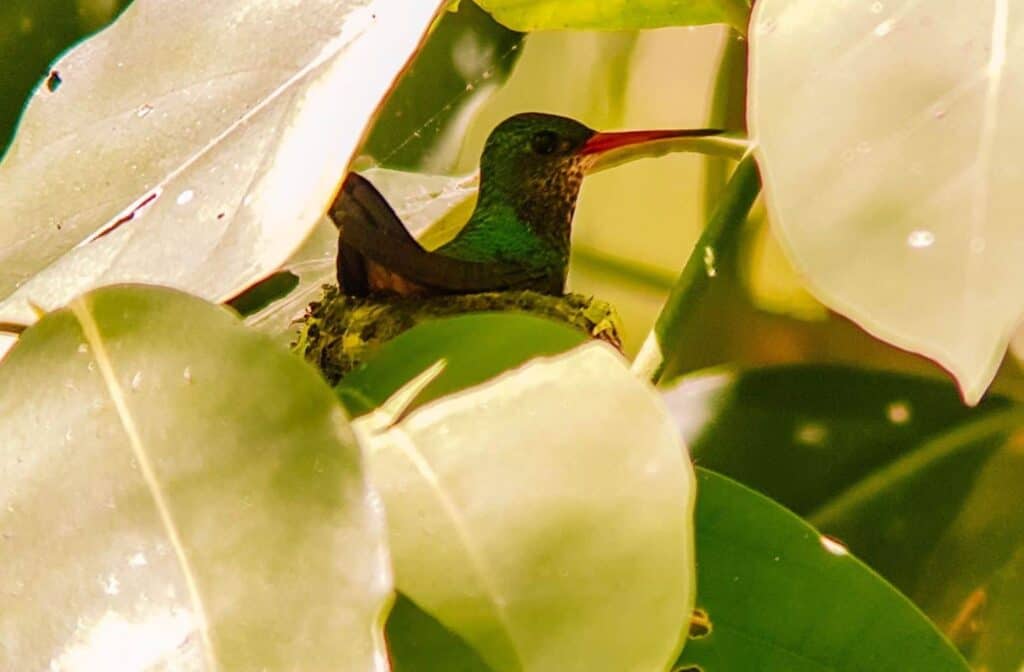
-If you are traveling with kids, a great place to pique their interest in bird watching and see a condensed amount of birds in one area is at the La Paz Waterfall Garden near the San Jose Airport.
This place acts as a rehab center to many wildlife species in Costa Rica including a variety of birds. The birds are in caged habitats for rehab and there is detailed information in English and Spanish at every birdcage.
-If you are looking for a good field guide for your trip, the consensus seems to be that The Birds of Costa Rica: A Field Guide and Photo Guide to Birds of Costa Rica are your best book options. We own the first book and I am not a huge fan of how it is organized, but Thomas (who is way more into birds and photography than I am) likes it a lot.
Conclusion
If you have any questions about the birds of Costa Rica don’t hesitate to leave them in the comment section below. We are always happy to help you out.
Also, if you have any tips for fellow bird watchers, please leave those as well.
You Might Also Like:
Costa Rica Travel Details: What You Need to Know
🚗 Should I rent a car in Costa Rica?
Having a rental car will give you the most flexibility when traveling in Costa Rica. This will also allow you to take fun day trips on your own.
- Save 10% Plus Other Perks with Our Adobe Rental Car Discount
- You might also consider; shared shuttle services or private transfer services
🏄🏽 How can I book things to do?
We find that Viator tends to have the most comprehensive selection of activities with secure booking and good cancellation policies.
🍍 I’m overwhelmed with planning. Can you help?
Of course! I suggest joining our Facebook group for specific questions and head to our Start Here Page to get started planning.
✈️ What is the best way to book a flight?
Usually, we have the best luck finding great prices with Skyscanner. Check for flights to both San Jose Airport (SJO) and Liberia Airport (LIR).
🛏️ What is the best way to book my Costa Rica hotels?
We highly suggest Booking.com for hotel bookings and typically use VRBO for Costa Rica vacation rentals.
🗣️What is the main language in Costa Rica?
The main language in Costa Rica is Spanish. Most people working in tourism speak at least some English.
💰 What is the currency in Costa Rica?
The currency used in Costa Rica is the Costa Rican colón (CRC). However, the US dollar is widely accepted in most tourist areas
📞 What is the best way to stay connected?
An eSIM from Airalo is the easiest way to get 4G data while traveling in Costa Rica.
🌴 Is Costa Rica safe?
Generally, Costa Rica is considered safe for tourists. However, like any travel destination, it’s best to use caution and be aware of your surroundings.
🛂 Do you need a passport to go to Costa Rica?
Yes, Costa Rica is its own country. You will need a passport to visit.

Hi! We’re Thomas (the German) and Sarah (the US-er)
We met in Virginia, moved to Germany, and since 2016 we have lived in sunny Costa Rica.
It was a spontaneous decision to move here, but it was the best decision!
Now we spend our days roaming the country to bring you the very best in Costa Rica travel here on Costa Rica Vibes.
Sarah is the writer. Thomas is the one keeping it all together.
Want the whole crazy story?

Sarah McArthur
Sarah McArthur is the co-founder and main writer of Costa Rica Vibes.
She is originally from the United States but has lived in sunny San Jose, Costa Rica since 2016.
She has traveled all over the country and now considers herself a self-proclaimed Costa Rica travel expert.
Want the whole crazy story?

